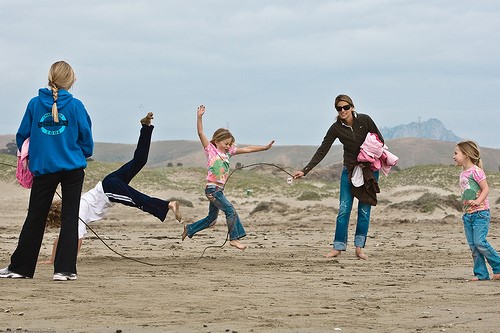4 Ways to Nurture Your Child’s Spirituality

Being spiritual, or believing in the existence and authority of a divine power, is the basis of most of the world’s great religions. Spirituality also has another, more tangible purpose: it can guide human behavior over a lifetime.

Image via Flickr by mikebaird
To get these beneficial lifelong behaviors, parents should nurture and encourage their child’s spiritual growth and development as part of their ongoing family development. This can be done through informal spiritual, as well as more formal religious education. Both are essential to building lifelong values.
Since religion provides a sense of purpose and meaning, parents should show these difficult-to-understand concepts by example. This is best done through music, dramas and discussing the meaning of spirituality, including the reality of birth and death. Parents should encourage questions and admit when they do not have the answers. Children commonly imitate what they see ant home and what their parents do, so praying as a family can be a profound learning experience.
One 1998 academic study of high school seniors found strong correlation among those who were religiously observant and acknowledged the importance of religion in their lives were less likely to engage in anti-social behaviors, while also exhibiting better health and safety habits. This University of Michigan study was one of the first to link religious observance, spirituality, and health-related practices in adolescent behaviors.
Since we live in a materialistic world which relies more on building confidence from outside sources (other people, as well as items), parents should stress that their kids have the ability, knowledge and inner strength to do great things and overcome obstacles. Building inner confidence takes time, but it can be done if positive, uplifting messages are shared on a daily basis, and getting inspired by our world’s powerful creations, such as through music and nature. The role and benefits of charity should also be taught.
While everyone has their own level of formal religious observance and devotion, many people appreciate the divine aspects of our world. Nature in all its forms – weather, plants, the ocean the stars – has the potential to give a lesson in spiritual growth and religious amazement. Appreciation of these elements stem from a foundation in a church. Spiritual domains, such as Ed Young Fellowship Church, provide the fundamental religious understanding for children to grasp. People who appreciate these life and natural forces often feel safer in the world and, as a result, are more confident to manage life’s challenges.
Open family discussions are the best place to teach the meaning and power of spirituality. This interactive family activity, which encourages everyone’s participation, relies on a strong marriage with definite, reliable parental leadership. With parents as the literal and figurative leaders, children will understand that religious observance and belief have a definite origin and direction. This leadership structure, with parents as the heads of the household, also provides the perspective which directs the children
While teaching an appreciation of spirituality is not easy, these suggestion have a common goal: To link an appreciation of the divine, in all its forms, with the positive direction that faith provides. This is the way we can expand our children’s perspectives, so they are better able to mature into stronger adults with a powerful vision of how to manage life’s challenges.
